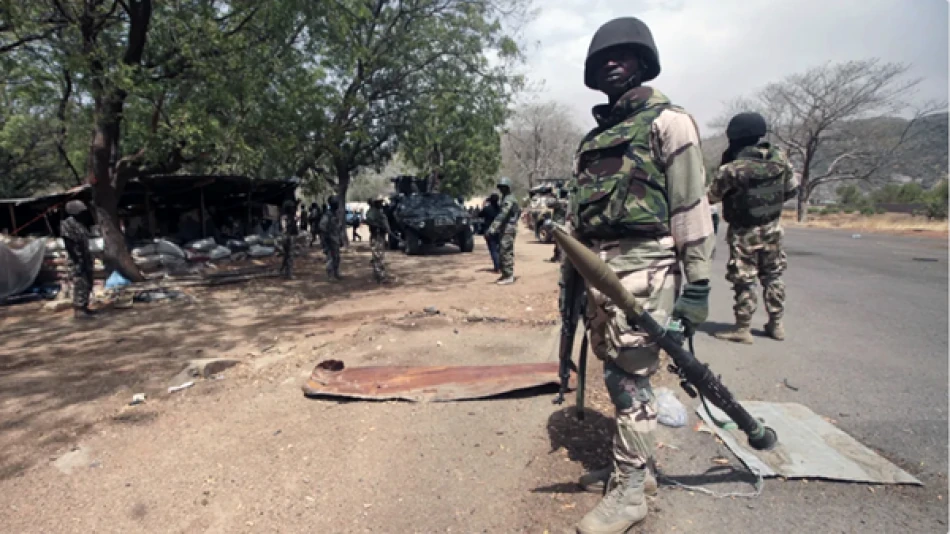
Nigerian Army Eliminates Dozens of Bandits in Decisive Operation
Nigeria's Military Strikes Back: Over 100 Armed Gang Members Killed in Major Anti-Banditry Operation
Nigerian forces have delivered their most significant blow yet against the country's notorious armed gangs, killing more than 100 "bandits" in a coordinated air and ground assault in Zamfara State. The operation represents a major escalation in Nigeria's fight against criminal groups that have terrorized rural communities for years, signaling a potential shift toward more aggressive military tactics in addressing the country's deepening security crisis.
The Strike: Precision Timing Against Criminal Networks
According to a UN-backed conflict monitoring report, the military operation launched in the early hours of Sunday morning targeted a camp of over 400 bandits in Makakarai forest within Bukkuyum Local Government Area. The coordinated strike combined fighter jets with ground forces, catching the criminals as they allegedly planned attacks on farming communities.
The timing appears strategic. The assault came as a direct response to escalating bandit activities throughout Zamfara State over the past month, including a devastating Friday attack on Abadka village that left 13 security personnel dead and resulted in multiple kidnappings.
Nigeria's Bandit Crisis: From Land Disputes to Organized Crime
What began as conflicts between cattle herders and farmers over land and water rights has evolved into a sophisticated criminal enterprise. These armed groups, locally known as "bandits," have transformed Nigeria's northwest and central regions into zones of fear, systematically targeting remote rural communities with kidnapping, extortion, and violence.
The Economic Impact
The bandit crisis has created a parallel economy built on ransom payments, with kidnapping becoming increasingly lucrative. Rural communities face a devastating cycle: attacks disrupt agricultural production, while ransom demands drain local resources. This has contributed to food insecurity in regions that should be Nigeria's agricultural backbone.
Military Strategy: A New Aggressive Approach?
Sunday's operation suggests Nigeria may be adopting more decisive military tactics against criminal networks. The scale of the assault—targeting over 400 bandits in a single location—indicates improved intelligence gathering and operational coordination between air and ground forces.
Lessons from Regional Approaches
Nigeria's challenge mirrors security crises across the Sahel region, where countries like Mali and Burkina Faso have struggled with armed groups. However, successful counter-insurgency operations in neighboring Chad and Niger demonstrate that coordinated military pressure can disrupt criminal networks, though sustained political and economic solutions remain essential for long-term stability.
Implications for Nigeria's Security Architecture
This operation could mark a turning point in Nigeria's security strategy. The success of the Zamfara strike may encourage similar large-scale operations across affected states, potentially forcing bandit groups to adapt their tactics or relocate to less defended areas.
For Nigeria's government, demonstrating military effectiveness against bandits is crucial for political legitimacy, especially as the country faces multiple security challenges from Boko Haram in the northeast to separatist movements in the southeast.
For local communities, the operation offers hope but also raises concerns about potential retaliation. Historical patterns suggest that successful military strikes often prompt bandits to intensify attacks on soft targets as they seek to reassert control and demonstrate resilience.
The Path Forward: Military Success Needs Political Follow-Through
While Sunday's operation represents a tactical victory, addressing Nigeria's bandit crisis requires more than military action. The underlying issues—poverty, unemployment, ethnic tensions, and competition for natural resources—demand comprehensive political and economic solutions.
The test now lies in whether Nigeria can build on this military success with sustained operations while simultaneously addressing the root causes that allow criminal networks to recruit and operate. Without this dual approach, even significant tactical victories risk becoming temporary setbacks for criminal groups rather than lasting solutions for affected communities.
Most Viewed News

 Layla Al Mansoori
Layla Al Mansoori






